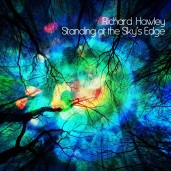
Richard Hawley
Standing at the Sky's Edge
(Parlophone/EMI; 2012)
By Maura McAndrew | 8 June 2012
Richard Hawley’s records are typically quiet, contemplative affairs, all bittersweet, shimmery ballads. But after its quiet, uneasy first notes, his seventh full-length Standing at the Sky’s Edge roars to life with the psychedelic crash of “She Brings the Sunlight,” ushering in a darker, swampier, more guitar-driven sound that stays away from ballads almost completely and bears resemblance to Ty Segall and the current San Francisco scene. A sometime session guitarist for pop acts (Robbie Williams, All Saints) and touring guitarist with Pulp, Hawley has always kind of done his own thing—less glam than Jarvis Cocker and co. and more into the down-to-earth early-‘60s vibes of Roy Orbison and the Beatles. Though his muted, graceful aesthetic has stayed more or less the same over the course of his eleven-year career, Hawley has broadened his palette ever so slightly, experimenting with different instrumental sounds, and that continues on this, his most audacious effort yet.
Hawley has spent much of his career crafting songs that are almost painfully specific to a particular place, his home of Sheffield, England (especially Coles Corner [2005] and Lady’s Bridge [2007]). But Standing at the Sky’s Edge, as its title implies, is bigger than all that. It still has a distinctly British brand of despair, but its stories are more abstract. If there’s still a subtle theme to this material, it’s those somewhat alienating, unknown aspects of nature: the darkest, deepest part of the woods, the damaging brightness of the sun, the impending isolation of winter. Hawley’s lyrics, as usual, are best when kept simple, and the record’s standout moments stick to mood and stay away from story.
“She Brings the Sunlight” really is the best way to start, fully exploring the sounds of 1960s psychedelic rock with its minor-key onslaught of guitar, violin, and even sitar. Hawley’s sharp guitar playing stands out here in the wall of sound he manages to create, particularly on the solo/breakdown which sustains the song through its noisy, bitter end. Hawley rocks out similarly on “Down in the Woods,” a menacing jam that reaches a siren-like wail and then gradually frays apart, and first single “Leave Your Body Behind You,” which has an essence of Doors-style grandiosity. If we’re talking pure repeat-listenability, “Seek It” is the best song for my money, though it’s the only classic Hawley track on the record: a simple, lovely, catchy ballad. It’s not a challenge and maybe it doesn’t quite fit, but it really is what he does best.
And here’s where I pause to talk about Hawley’s exceptional voice, the big reason the job “session/touring guitarist” is not enough for him. At times it has a Bowie-like vibrato, at times a Morrissey-like properness, but Hawley sings with such interesting texture, not quite gravelly-voiced but with a soft scrape at each note’s climax, like sandpaper on velvet. It’s what makes his singer-songwriter work that much better than many of his peers, but it also works well within the dark template of Standing at the Sky’s Edge. Hawley always comes off comfortable and completely himself, even at those times when melody and lyrics are a little on the thin side.
There are bound to be some drawbacks to a veteran songwriter venturing into new territory, and Hawley’s is that he can’t seem to sustain a consistent energy and mood throughout Standing at the Sky’s Edge. There are only nine songs but they’re long ones, with some of the lesser cuts sagging as they reach their five-to-six minute finish. In the most egregious example, the title track deflates things a bit following the bombast of “She Brings the Sunlight,” with uncharacteristically leaden lyrics about a number of down-on-their-luck sad sack clichés (for a horrifying moment, it reminded me of Everlast’s ’90s radio staple “What It’s Like,” but thankfully that feeling passed). Hawley makes it through with no sweat on his brow, however, relying on an airy creepiness and his rich voice to keep it afloat. And that’s kind of what he manages to do throughout, typically following one of his slacker compositions with one of his tightest, making you forget that you were starting to drift—see the way “Down in the Woods” and “Leave Your Body Behind You” tear through the indifference fostered by “Time Will Bring You Winter” and the Donovan-esque “The Wood Collier’s Grave.”
Overall, though Standing at the Sky’s Edge is a departure for Richard Hawley, it doesn’t provide a whole lot of surprises. This is a hardworking musician who has turned out album after album of solid material—maybe this new sound is more in line with current trends, more outside his Sheffield-centric comfort zone, but Hawley is still making personal, contemplative music. He’s pushing himself ever so slightly, and while it might not be enough to draw in the unconverted, the rest of us will want to stick around for more.





